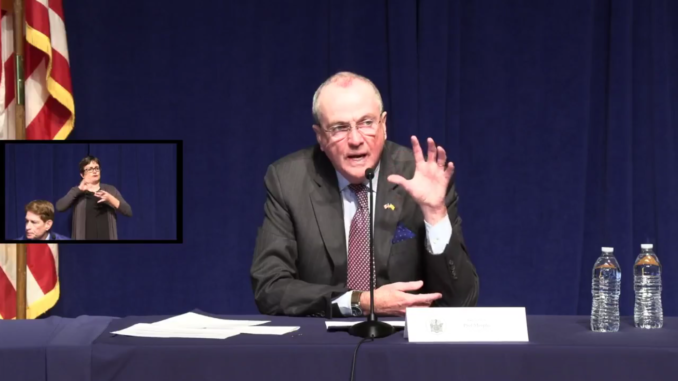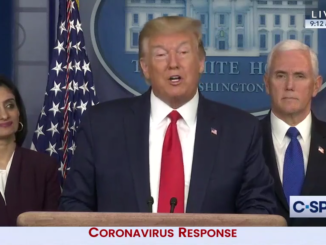
UPDATE: The Coronavirus testing site at Bergen Community College has reached maximum capacity and is closed for the day, Friday, March 20.
PARAMUS, N.J.—A drive-thru Coronavirus testing center at Bergen Community College is now open, as cases are expected to quickly rise into the many thousands, New Jersey Gov. Phil Murphy said.
The center is for people who have symptoms of Coronavirus—such as cough, fever and shortness of breath—not the worried well, Murphy said.
Murphy is expected to speak from the site, which is being administered by the Federal Emergency Management Agency, with state and local assistance, at some point today.
“Individuals experiencing respiratory illness symptoms, such as cough, fever and shortness of breath, are eligible for testing. If individuals don’t have respiratory illness, they will not be tested [Friday, March 20],” said New Jersey Commissioner of Health Judith M. Persichilli.
The site has the capacity to collect 2,500 specimens a week, Persichilli said.
People seeking to be tested should bring proof of New Jersey residency. The site is open from 8 a.m. to 4 p.m. in parking lots B and C at the college, 400 Paramus Road.
Another FEMA testing site is expected to open soon at PNC Bank Arts Center in Monmouth County.
Local ambulance corps have said people should not call 911 if they fear having contracted COVID-19, but should contact a health care provider. Additionally, the worried-well can disrupt efforts by requesting tests at this time, officials said.
All American citizens have been summoned to slow the spread of the virus by staying 6 feet apart from others, staying home if they are sick, or if a family member is sick, and practicing personal hygiene, such as not touching their face, covering their mouth if sneezing or coughing, and washing their hands for at least 20 seconds.
“The social distancing measures we’ve been asking you to follow are critical to flatten the curve of COVID-19 cases,” said Persichilli. “By flattening the curve, we’re decompress the peak of the outbreak, and spread the cases overtime to conserve health care resources.”
A Bergen County male in his 30s died, as officials say that COVID-19 is impacting younger people more than initially thought. Younger people can also unwittingly spread the virus to others, even if they are not showing symptoms, said Murphy.
He called for the immediate closure of any personal care business that cannot follow social distancing guidelines, including barbershops, hair salons, nail and eyelash salons, tattoo parlors and social clubs.
Visitation to long-term care facilities has been totally suspended, except in end-of-life circumstances, and all gathering of more than 50 people are prohibited, state leaders have ordered. A curfew from 8 p.m. to 5 a.m. is also in place, and all schools have closed while switching to online instruction.
Bans on larger gatherings of people must be enforced aggressively, Murphy said, and may soon be further restricted.
“It has to be enforced aggressively… We mean business,” Murphy said. “We just know that if we flatten the curve… we will save lives.”
Hackensack Meridian Health CEO Robert C. Garrett said his organization, the largest health care provider in New Jersey, will face a significant supply shortage of personal protective equipment and ventilators, but that flattening the curve gives front-line medical professionals a fighting chance.
“This pandemic is by far the most disruptive force that I’ve ever seen in our health care system,” said Garrett. “We are literally engaged in a global war with the COVID-19 Coronavirus. Health care workers are on the front line of everything that is happening. We are in this for the long haul. This will tax our clinical and human resources like we’ve never seen before.”
Garrett said March 19 that 150 health care professionals in his organization have been quarantined due to contracting COVID-19 or displaying symptoms.
States including New Jersey are working with the U.S. Army Corps of Engineers to retrofit any available infrastructure to expand health care capacity or house medical professionals responding to the crisis.
If you have questions or concerns, you can call 211, or (800) 962-1253, or go to nj.gov/health.
Economic impact
Murphy encouraged business owners to visit cv.business.nj.gov, and said they are working to mitigate the impact on the hardest hit—those who work by the hour, or those who work in the gig economy. Grants may soon become available for businesses, Murphy said. .
The state has suspended evictions and foreclosures, with Murphy saying we simply cannot have families already anxious about the health then anxious about losing a roof over their head.
New Jersey, New York and Connecticut state governments need about $100 billion from the federal government to stay at the point of attack in responding to COVID-19 emergency, Murphy said.
NJ Transit, the state’s largest public transportation provider, said it will have a $1.25 billion shortfall by 2021, Murphy said.
Election canvassing goes digital
While the state’s June 2 Primary Election is on as scheduled, for now, in-person canvassing for voter signatures has been ordered to go digital, and forms are available at elections.nj.gov. The March 30 petition deadline remains intact, and signatures that have already been collected on paper should still be submitted, officials said.
Special Elections in April and May will be conducted by vote-by-mail.
“There is not greater right in a democracy than the right to vote. Over the years, people have literally given their lives for their right to vote,” Murphy said. “But given the current emergency, we want to make sure everyone is safe.”



